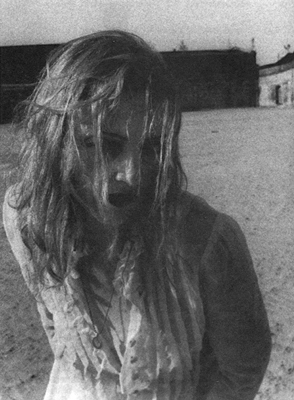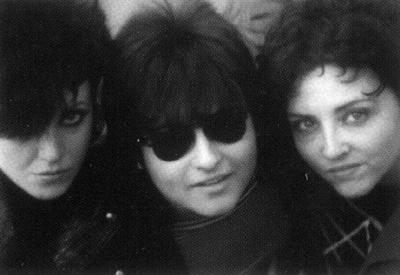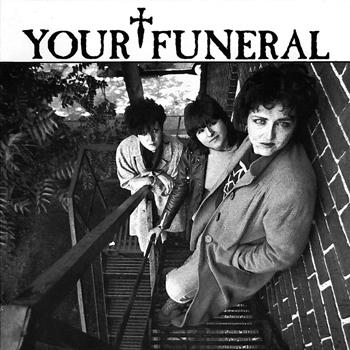JERI CAIN ROSSI

pic by Jim Merrill (1995)
Life is a Slow Death
Interview by Eduard Barcelón
(April 2012)
Jeri Cain Rossi was born and raised in America's rural Midwest. She is the author of Angel With A Criminal Kiss and Red Wine Moan. Her writing has been exhibited at the Whitney Museum in New York and performed at Boston's Institute of Contemporary Art, among other venues. As a musician, Rossi has opened for Sonic Youth, The Birthday Party, and Nick Cave & the Bad Seeds. She directed a 16 mm short film, Black Hearts Bleed Red, featuring artist Joe Coleman. Rossi currently lives in San Francisco.
The interview was conducted by email, Barcelona to/from San Francisco, summer 2010. ED NOTE: This originally appeared in Making Waves magazine. Special thanks to Mary Lockjaws for her help with this.
Q: First off, as a sort of introduction, it would be nice if you could describe how the city of Denver was in the late '70's and early '80's, and how the whole underground music scene started. I am intrigued to know if the fact that Jack Kerouac, Neal Cassady and Allen Ginsberg had spent time living in the city in the '40's gave Denver a reputation of being an alternative place to locate during the next decades, and if that was the original seed for the whole alternative movement.
JCR: Cassady grew up in skid row section of downtown Denver. His father was hobo and an alcoholic. Cassady did petty theft and might have been a gay hustler when he was in his teens. Stole his first car when he was fourteen. He was in and out of reform school.
Cassady met Ginsberg and Kerouac in NYC when Allen and Jack were going to Columbia University. Ginsberg fell in love with him and followed him to Denver. Neal met his wife Carolyn while she was going to grad school in Denver in the '40's. There's a story she tells that how she met Allen Ginsberg is she came home from class one day to find a naked Neal & Allen sleeping on her dorm bed.
Ginsberg was in love with Neal and that's how he came to be there on and off. He helped in the founding of the Naropa Institute in Boulder, a school that focused on Buddhism and writing. Yes, the Beats hung out here in Denver because of Neal but Denver and Boulder are more known for the Hippie scene of the '60's and '70's: a laid back, open minded, nature loving, spiritual vibe when I moved there in December 1980, just after John Lennon was shot.
Q: Musically speaking, I guess the Wax Trax label had a huge role in its development as well. Were there any other factors? What were your personal reasons for moving to Denver and when did you settle in?
JCR: This is confusing but the original owners of Wax Trax – Jim and Danny – sold it and moved to Chicago to start the Wax Trax label. I worked for Duane and Dave, who bought the store in Denver from Jim and Danny and kept the name. Duane and Dave were crazy music fanatics. They used to be social workers and big hearted, so as employees we could get away with a lot of shit and they understood. It was the best job I ever had, working at Wax Trax Records in the early '80's.
When I was going to college in Champaign-Urbana Illinois I was lucky to have been friends with The Vertebrats. They were truly great and rootsy. I moved to Denver there after college to live with my sister and wanted to start a band. There was an underground scene in Denver and lots of performance art. Very arty. Like the Great Carbon Dioxide Orchestra where we all played metal holding dry ice with gloves. Or the Small Appliance Orchestra where we all played amplified toasters and blenders and blow dryers and the like. I missed the true punk years of Denver. I witnessed the new wave, the avante garde/industrial and the hardcore scenes.
Q: Once you were in Denver, how did you get involved in the burgeoning DIY scene? Were there any local band that you liked and really spoke to you?
JCR: Denver underground was a fairly small scene so it wasn't too long before everybody knew everybody else. Before I started working at Wax Trax, I was doing a music newspaper with Duane, one of the owners, called Local Anesthetic. Then I started working at Wax Trax also. Since I lived at the hub of it all, I knew what was going on and went out a lot. I remember loving Crank Call Love Affair, The Frantix.
Q: Regarding Your Funeral, how did you meet Karen Sheridan and Cleo Tilde? How did the idea of forming a band start? Did you play in other bands before? What were your influences?
JCR: I met Karen from hanging out at art gallery openings, gigs. She had spent time in London and was very cool & stylish and had big aspirations. We became friends to start a band, a British influenced Cure-ish kinda band which became Your Funeral. I knew guitar from playing folk bars in college and she picked up bass. We met Cleo who was more into The Ramones. She was in an all girl band called The Guys.

From left to right: Karen, Cleo, and Jeri; pic by Duane Davis (1982)
At the time, my musical style was more rootsy and pop, case in point: "I Want To Be You." Besides The Cure, I was also influenced by Echo and the Bunnymen, Joy Division, and especially The Gun Club (though you can't tell by our music). The Gun Club had toured to Denver and Boulder in '81 and that was the first time a performance changed my life. The other time was when my band opened for The Birthday Party in '83. I wasn't the same after either those shows.
My lyrics were way depressing, dark. By the age of twenty four, I had lost a boyfriend in an apartment fire and my father to depression. I took their deaths incredibly hard. Thus the name: Your Funeral. A little-girl-lost take on the impermanence of nature. Karen was way into it as well, but our dark, unsmiling broodiness drove Cleo crazy.
Q: Back in the late '70's and early '80's, I guess the number of people involved in the scene wasn't very big, so you knew each other pretty well. Although punk really opened doors for women, it seems that scenes were still male-dominated and there were not many women playing in bands. When Your Funeral started, what kind of reactions did you receive?from audiences, local groups, etc? Were people supportive or did you have problems, being an all-girl band?
JCR: There had been other popular all female punk bands before our time in Denver- The Profalactics, The Guys and The Varve. I never saw them. The alternative scene was very supportive of us. When Crank Call Love Affair went off on tour (who were also very dark and so so great), we were pegged to fill the gap for the brooding and troubled. We were together for less than a year as an all female trio. Then we split up, Karen ran off to London, and I retained the name and played with other people, mostly guys.
Q: The story behind Your Funeral 7" seems to be very funny – that whole evil and satanic thing coming from the pressing plant. Could you please tell me a little bit more about that?
JCR: I started Local Anesthetic with Duane and we covered musical happenings around Denver, mostly underground. Wax Trax published it. Then Duane got the idea to press a single of Allen Ginsberg playing with The Gluons, a song called "Birdbrain." I think later Ginsberg did the song with The Clash live. We went to the recording and sat in the sound room with the great Allen Ginsberg while he was reciting the poem "Birdbrain" on to a track. Well, Allen Ginsberg was having a hard time keeping to the rhythm of the song The Gluons had laid (down) so the producer was getting quite irate and demanded that everyone clear the sound room. But Allen Ginsberg, like a gentle, holy saint, spoke "no, don't send them away. I like artists."

Your Funeral 7", Local Anesthetic (1982)
So that was the official first single Duane put out. Then he asked if Your Funeral wanted to do a single. We recorded it with Geoff Landers and Bob Drake at the Packing House in 1982. Five hundred copies. It was when we went to repress the single for another five hundred copies that the Wyoming pressing plant refused to as they were a Christian based company and the name Your Funeral, and the suicidal lyrics appalled them. I don't know how much all that cost, not much as we sold them for a couple bucks each. (I might have a xerox of the letter in storage). The picture from the single was from some fire escape in Capitol Hill area, where I lived, and where Wax Trax is located.
Q: Apart from these very specific details, the fact that a pressing plant refused to press anymore records for the only reason that you seemed to be evil or satanic is really surprising. Was it really hard to be a punk back in the day in Denver? Are there any anecdotes you can recall?
JCR: I don't remember anything out of the ordinary. It was a shock to us about the pressing plant's rejection. We viewed them as bizarre and cultish.
Q: How long were Your Funeral active?
JCR: Less than a year.
Q: How many gigs did you play?
JCR: Under twenty gigs.
Q: Did you ever play outside Denver?
JCR: No.
>Q: What was the reason you only recorded a 7"?
JCR: We broke up.
After the initial all-girl trio disbanded, I reformed with Phil Teague and Michael Sidlow and that was the best formation of Your Funeral. We were loud and noisy and crazy great. I played bass. Phil played a noisy noisy rootsy style on his Fender Jaguar and Michael played drums. I threw out most of my songs except for a few and we added other songs that Phil wrote. By this time, I was throwing out the gothy British thing and going for the Americana roots thing. We had volatile personalities and unfortunately, we didn't last long. The day we got The Birthday Party gig was the day they both quit. I asked some friends to fill in and opened for The Birthday Party and it was great, but I always regret I didn't beg Phil and Michael to let bygones be bygones and do the gig because it was truly one of the best bands I was ever in. I don't even have a practice tape of us.
Q: Could you tell me a little bit more about Die Migrains?
JCR: Die Migrains also started out all-female, a noisy sloppy Flipper-esque quartet. That was Mary Frembgen and Suzanne Lewis on guitar, Linda Dershang on bass and myself on drums. I remember I got this scheme to have a battle of the bands with The Frantix so I went up to Matt the bass player, threw a drink in his face or something and challenged his band to a duel on the stage. We organized the battle of the bands at the Gaga Club in the Meat Packing District, a lonely industrial area. Both bands got on stage at the same time and we were supposed to trade songs but The Frantix started playing through our songs, so we started playing through their songs, then it became one big cacophony and something happened- we started sounding like Glenn Branca orchestra or something, it was over the top. Jello Biafra was in town and jumped on stage and did an impromptu spoken word rant over the cacophony.